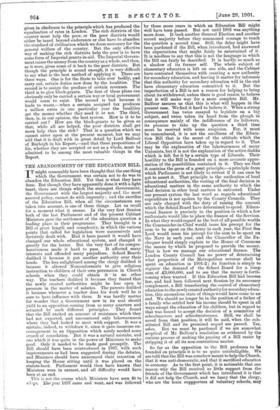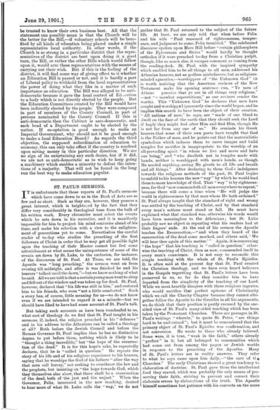THE ABANDONMENT OF THE EDUCATION BILL.
IT might reasonably have been thought that the one thing which the Government was certain not to do was to abandon the Education Bill. Yet that is what they have lone. But though they have apparently done it with a light heart, there are things which the strongest Government, the Government with the largest majority and the most assured policy, cannot do with impunity; and the sacrifice of the Education Bill, when all the circumstances are taken into account, is one of these things. Let us recall for a moment what it means. In the very first Session both of the last Parliament and of the present Cabinet Ministers gave the settlement of the education question a leading place in their programme. They brought in a Bill of great length and complexity, in which the various points that called for legislation were successively and decisively dealt with. Had it been passed it would have changed our whole educational system, and changed it greatly for the better. But the very fact of its compre- hensiveness made it hard to pass. It affected many interests and offended many prejudices. School Boards disliked it because it put another authority over their heads. The less enlightened among the clergy disliked it because it allowed Nonconformists to give religious instruction to children of their own persuasion in Church schools when they could obtain it in no other way. The teachers disliked it because they feared that the newly created authorities might be less open to pressure in the matter of salaries. The parents disliked it because whenever a teacher does his work well he is sure to have influence with them. It was hardly matter for wonder that a Government new in its seat should yield to an opposition coming from so many quarters and actuated by such different principles. They found that the Bill excited an amount of resistance which they had not expected, and encountered only lukewarmness where they had looked to meet with support. It was a mistake, indeed, to withdraw it, since it gave immense en- couragement to an Opposition which sorely needed some crumb of consolation. But it was a natural mistake, and one which it was quite in the power of Ministers to make good. Only it needed to be made good promptly. The Bill should have been reintroduced in 1897, with such improvements as had been suggested during the debates, and Ministers should have announced their intention of keeping the House sitting until it was placed on the statute-book. Parliament would then have known that Ministers were in earnest, and all difficulty would have been at an end.
This is not the course which Ministers have seen fit to adapt. The year 1897 came and went, and was followed by three more years in which an Education Bill might well have been passed. But not until 1901 was anything more done. It took another General Election and another record majority before they summoned courage to touch the question a second time. Still, the delay might have been pardoned if the Bill, when introduced, had answered the expectations that might fairly be entertained of it.
It is needless to say that this is not the language in which the Bill can fairly be described. It is hardly so much as a shadow of its former self. The whole subject of elementary education is left on one side, and the Cabinet have contented themselves with creating a. new authority for secondary education, and leaving it matter for inference that this authority for secondary education will in the end have elementary education committed to it. But the imperfection of a Bill is not a reason for helping to bring about its withdrawal, unless there is good reason to believe that it will make way for a more complete Bill. Mr. Balfour assures us that this is what will happen in the present case. We find it hard to believe it. When a strong Government has twice essayed to legislate on a big subject, and twice taken its hand from the plough in consequence mainly of the indifference of its followers, its promise to take up the question a. third time must be received with some suspicion. For, it must be remembered, it is not the smallness of the Educa- tion Bill that is the secret of the attitude which the Liberal Opposition have taken up in regard to it. That may be the explanation of the lukewarmness of many Unionists, but it is not the explanation of the active dislike which is felt for it by a certain type of Liberals. Their hostility to the Bill is founded on a more accurate appre- oiation of the possibilities contained in it. They see that it contains the germ of a great principle,—a principle from which Parliament is not likely to retreat if it can once be got to assert it. That principle is the unification of local educational authorities, the vesting of the final decision in educational matters in the same authority to which the final decision in other local matters is entrusted. Under our present system the last word as regards educational expenditure is not spoken by the County Councils. They are only charged with the duty of raising the amount which the School Board have determined to spend. Educa- tional finance is precisely in the position in which a few enthusiasts would like to place the finance of the Services. In what they would regard as the best of all possible worlds the Commander-in-Chief would issue his precept for the sum to be spent on the Army in each year, the First Sea Lord would issue his precept for the sum to be spent on the Navy in each year, and the Chancellor of the Ex- chequer would simply explain to the House of Commons the means by which he proposed to provide the money. That is how we manage our educational finance. The London County Council has no power of . determining what proportion of the Metropolitan revenue shall be spent on education in 1901-2; its function is simply to register the demand of the School Board for a lump sum of £3,000,000, and to see that the money is forth- coming when wanted. If this Education Bill had become law, and had been followed next Session by its necessary complement, a Bill transferring the control of elementary education to the newly created authority for secondary educa- tion, this anomalous state of things would have come to an end. We should no longer be in the position of a father of a family who settled how his income should be spent in all ways except the education of his children, but in regard to that was bound to accept the decision of a committee of schoolmasters and schoolmistresses. Still, we shall be saved from that position, it will be said, when the sub- stituted Bill and its promised sequel are passed. Yes, when. But we must be pardoned if we are somewhat sceptical of Mr. Balfour's resolution as evidenced by the curious process of making the passing of a Bill easier by stripping it of all its non-contentious matter.
So far as the opposition to the Bill professes to be founded on principle it is to us quite unintelligible. We are told that the Bill was somehow meant to help the Church, that it was anti-democratic, and that it sacrificed education to economy. As to the first point, it is noticeable that one reason. why the Bill received so little support from the friends of the Government which has introduced it is that it did not help the Church, and we fancy that the clergy, who are the main suppportem of voluntary schools, may be trusted to know their own business best. All that the statement can possibly mean is that the Church will be the better for the Bill,—if voluntary schools will be bene- fited by all kinds of education being placed under a single representative local authority. In other words, if the Church is so strong in a particular district that the repre- sentatives of the district are bent upon doing it a good turn, the Bill, or rather the other Bills which would follow upon it, would arm these representatives with the means of carrying out their wish. But if this is the feeling of the district, it will find some way of giving effect to it whether an Education Bill is passed or not, and it is hardly a part of Liberal policy to withhold from the local representatives the power of doing what they like in a matter of such importance as education. The Bill was alleged to be anti- democratic because it gave the local control of Ed-cation to a body which is not directly elected by the people. But the Education Committees created by the Bill would have been indirectly elected by the people. They were composed in part of members of the County Council, in part of persons nominated by the County Council. If this is anti-democratic then the Cabinet is anti-democratic, and each head of a Department ought to be elected by the nation. If co-optation is good enough to make an Imperial Government, why should not it be good enough to make a local Education Board? As regards the third objection, the supposed subordination of education to economy, this can only take effect if the country is resolved upon saving money in this particular direction. We see no sign of its entertaining any such desire, but if it did, we are not so anti-democratic as to wish to keep going a machinery which enables a minority to defeat the inten- tions of a majority. That will not be found in the long run the best way to make education popular.





















































 Previous page
Previous page